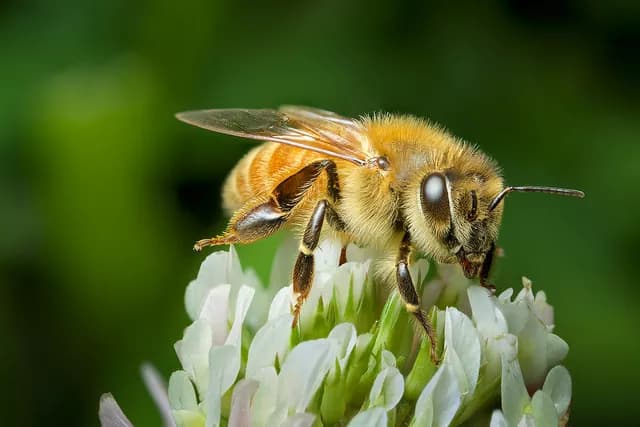
Honeybees Could Play A Role In Developing New Antibiotics
An antimicrobial compound made by honeybees could become the basis for new antibiotics, according to new research at the University of Illinois at Chicago.
No new antibiotics have been discovered for more than 30 years, and some bacteria are becoming immune to the drugs used to treat or prevent infections. Antibiotic resistance, called one of the world's most pressing public health concerns by the Centers for Disease Control and Prevention, can mean illnesses that were once easily treatable are now potentially deadly.
Each year in the U.S., at least two million people become infected with bacteria that are resistant to antibiotics, and at least 23,000 people die each year as a direct result of these infections, according to the CDC. Many more people die from other conditions that were complicated by an antibiotic-resistant infection.
In a new study published in the journal Nature Structural & Molecular Biology, UIC researchers, led by co-investigators Alexander Mankin and Nora Vázquez-Laslop of the College of Pharmacy's Center for Biomolecular Sciences, explain how a derivative of the antibiotic apidaecin -- Api137 -- can block the production of proteins in potentially harmful bacteria.
Many antibiotics kill bacteria by targeting the ribosome, which makes all the proteins in the cell. Protein production can be halted by interfering with different stages of translation -- the process by which DNA is "translated" into protein molecules -- Mankin said. Api137 is the first known inhibitor of translation termination, he said.
Api137 is a natural product produced by bees, wasps or hornets. In nature, many organisms defend themselves from infection by making antibacterial peptides, or small proteins. The peptides can be used as antibiotics if "we understand how they work," said Tanja Florin, a UIC doctoral student who served as one of the lead authors on the paper.
"This project was a result of an excellent collaboration of our team," said Vázquez-Laslop, who worked with two research groups in Germany. "We can now harness the knowledge of how Api137 works in order to make new drugs that would kill bad bacteria using a similar mechanism of action."
Materials provided by University of Illinois at Chicago. Note: Content may be edited for style and length.
Disclaimer: DoveMed is not responsible for the accuracy of the adapted version of news releases posted to DoveMed by contributing universities and institutions.
References:
Tanja Florin, Cristina Maracci, Michael Graf, Prajwal Karki, Dorota Klepacki, Otto Berninghausen, Roland Beckmann, Nora Vázquez-Laslop, Daniel N Wilson, Marina V Rodnina, Alexander S Mankin. (2017). An antimicrobial peptide that inhibits translation by trapping release factors on the ribosome. Nature Structural & Molecular Biology. DOI: 10.1038/nsmb.3439
Related Articles
Test Your Knowledge
Asked by users
Related Centers
Related Specialties
Related Physicians
Related Procedures
Related Resources
Join DoveHubs
and connect with fellow professionals

0 Comments
Please log in to post a comment.